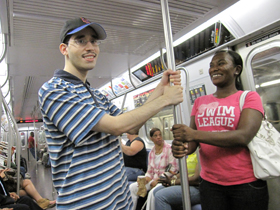Independent Travel Training
 The YAI Network is pleased to offer the service of independent travel training to individuals with intellectual and developmental disabilities who attend YAI Day Habilitation programs.
The YAI Network is pleased to offer the service of independent travel training to individuals with intellectual and developmental disabilities who attend YAI Day Habilitation programs.
Travel training at YAI is an intensive, one-to-one, short-term program which teaches individuals to travel round-trip safely and independently between home and our program. Many of our participants spend 1-3 hours traveling to and from program by van service. Individuals who are able to travel independently spend much less time in transit, and are afforded greater opportunities for independence, integration and community inclusion through recreation, employment and other activities.
Our travel training staff members have been trained by District 75 of the New York City Department of Education, which has been training NYC students to travel independently for more than 40 years. YAI is a member of the Association of Travel Instruction (ATI).
How does the travel training process work?
The travel training program is a 3-step process:
1. Referral and assessment. Individuals enrolled in YAI Day Habilitation Programs, or involved in the intake process, are eligible for referral. Interested candidates should speak with their program supervisors to determine if a referral should be made. Once referred, a thorough assessment with a member of the travel training team is scheduled. Appropriate candidates must possess sufficient basic safety skills in order to be assessed as eligible for the program. Once the initial assessment is completed, our staff will begin to work with the individual and their parent/guardian/Medicaid Service Coordinator to begin the actual travel training process.
2. Individualized travel training. Our trainers work with each individual on a one-on-one basis and identify a route of travel from home to the day program and back. Parents/guardians may offer input on a preferred travel route, and have daily communication with travel training staff throughout the process. Our trainers meet individuals each morning at their homes and travel with them on public transportation to and from program. Trainers guide the development of skills including decision making, what to do if lost, dealing with environmental issues and learning an alternate route. The training concludes with a “following, ” when trainers observe individuals who believe they are traveling alone, to observe their skill level and behavior.
Individualized travel training. Our trainers work with each individual on a one-on-one basis and identify a route of travel from home to the day program and back. Parents/guardians may offer input on a preferred travel route, and have daily communication with travel training staff throughout the process. Our trainers meet individuals each morning at their homes and travel with them on public transportation to and from program. Trainers guide the development of skills including decision making, what to do if lost, dealing with environmental issues and learning an alternate route. The training concludes with a “following, ” when trainers observe individuals who believe they are traveling alone, to observe their skill level and behavior.
3. Evaluation. Each program participant must meet the required levels of competency in order to complete the program and travel independently. If the individual is evaluated to be unable to safely travel independently at this time, arrangements will be made to place the individual back on transportation to and from the program. Individuals can be re-evaluated at a later date.
See also:



|
Your Own Personal New Orleans Tour (Travel Guide): Seven Things You Must Do To Have a Fabulous Time in The Crescent City - A Guide For Visitors and Locals Alike Book (CreateSpace Independent Publishing Platform) |






